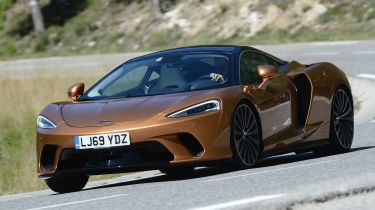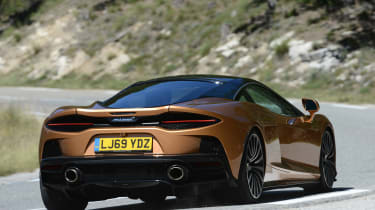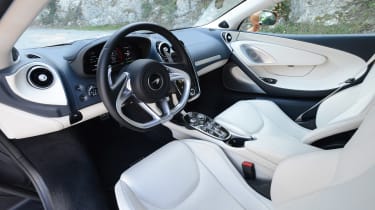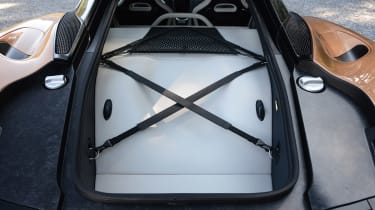McLaren GT coupe review
“The McLaren GT is very refined, quick and luxurious - it’s the company’s answer to the Bentley Continental GT”
Pros
- Stylish
- Comfortable and fast
- High-quality interior
Cons
- Only two seats
- Shallow boot
- No Apple or Android connectivity
McLaren’s small model range currently consists of the 720S, the GT and the new plug-in hybrid Artura, as well as a few limited-run specials like the Elva and the 765 LT. Unlike rivals such as Ferrari and Lamborghini, who’ve somewhat reluctantly given attention to the production of an SUV, McLaren has stuck firmly to two-seater supercars, with the McLaren GT billed as its most practical model to date.
We had wondered whether the GT would feature a small set of rear seats to make it more usable and practical than other Mclarens but instead, the brand focused on comfort and refinement for those in the two front seats. The car has a reasonably large boot, plus a ‘frunk’ under the bonnet.
 The top 10 best sports cars in 2025
The top 10 best sports cars in 2025
The design of the McLaren GT bears a passing resemblance to the 720S and the now discontinued 570S and 540C models but the styling is unique. It’s sleeker and less aggressive than other Mclarens and all aerodynamic considerations have been contained within the bodywork to prevent spoiling the car’s clean lines. There are large air vents at the front, sides and rear, hinting at the car’s impressive performance. In spite of its sleek looks, it offers a decent amount of ground clearance similar to that of a Mercedes C-Class, so you won’t be constantly grounding the nose of the car on speed bumps.
As for performance, the GT is as rapid as you’d expect from a McLaren. It has 612bhp and 0-62mph takes a little over three seconds, and flat out the car will reach 200mph. A seven-speed gearbox and plenty of complex electronic aids help you deploy all the car’s power to the road via the rear wheels.
Grand Tourers like this and its rivals, which include the Bentley Continental GT, the BMW 8 Series and Aston Martin DB11, are designed to cover huge distances with effortless speed and comfort. At motorway speeds, the GT is impressively quiet and refined, even if the Bentley is still the best in class when it comes to overall comfort. To be considered a true grand tourer, the GT needed to combine a precise driving experience on twisty roads with effortless progress on motorways, and the McLaren is a success in this respect.
The steering is perfectly weighted and the car demonstrates impressive agility when you take corners quickly, yet it’s almost as easy to drive as a family hatchback at lower speeds. Under hard acceleration, the GT delivers ferocious, supercar-pace and a subtly menacing sound from its V8 engine.
MPG, running costs & CO2
For buyers that have no problem paying over £160,000 (plus options) for a supercar, fuel economy is unlikely to be a pressing concern. When you’re not using the car’s full potential, you can expect around 23mpg and CO2 emissions of 270g/km. This compares fairly well with the Bentley Continental GT, which returns 23.2mpg and 278g/km from its V8 engine, but the McLaren is a much lighter car, so we expected the gap in fuel economy to be a little bigger.
The first five renewal years will cost the standard rate of VED (road tax) plus the additional surcharge before dropping down to the standard rate like every other car. You’ll also have to factor in high prices for tyres, brakes and servicing, as you would with any supercar.
Engines, drive & performance
The idea of a car to cover continents is probably a bit antiquated now - most of us would just fly - but grand tourers like the McLaren GT still have to do it all. They have to be equally comfortable on the motorway and on city roads, and the McLaren fulfils this brief with ease.
Thanks to a 612bhp twin-turbocharged 4.0-litre V8 petrol engine, the GT is incredibly quick in a straight line; the car will sprint from 0-62mph in 3.2 seconds before reaching a top speed of 203mph. There’s a surprising amount of turbo lag if you allow the engine into the wrong part of the rev range but when the turbos are providing full boost, there’s substantial power on tap no matter which gear you're in.
The engine’s noise has been tuned to sound more like a traditional V8, with a distinctly softer tone than the 720S but it’s down to personal preference whether you like it more than the burbling of the Mercedes-AMG S 63 or the shriek of the Ferrari GTC4Lusso.
The McLaren GT is excellent when you decide to take the winding back roads. After a drive on the motorway, it’ll feel like the car has woken up. The steering is particularly accurate and communicative, while noticeably lighter than the more hardcore 720S, and it helps that the wheel is such a nice shape too. Regardless of how fast or steep the corner is, the car takes everything in its stride, with almost nothing in the way of body roll.
Three drive modes feature: Comfort, Sport and Track. In Comfort setting, the car is at its most docile, with the automatic gear shifts at their most refined. Try manual mode in the Comfort setting and the gear changes feel slightly off the pace. Sport and Track modes solve this, giving the car far snappier gear changes for a more responsive feel. The car’s brakes do seem a little numb at first but once you get used to the pedal feel, they offer formidable stopping power.
Interior & comfort
Slightly higher ground clearance than the average sports car means you don’t have to fold yourself into an odd shape in order to get into the GT, like you do in some sports cars, but there’s still a chunky carbon-fibre sill to slide over. Once you’re in, the cabin feels very airy and light - you can thank an electro-chromatic roof for that - and visibility is great. The sports seats are comfortable and supportive, while the paddles for the gearbox are tactile and all the dashboard buttons operate with an expensive click.
At motorway speeds, the GT is whisper quiet inside, although the noise level rises whenever you gently prod the accelerator. For the most part the ride is extremely comfortable and, while it can’t match the Bentley Continental GT, you’re never subjected to harsh jerks or shocks. It feels just as comfortable as any other modern McLaren but traditionally a GT should seem a level above sportier cars.
The latest version of McLaren’s infotainment system is fitted to the GT and it’s been tinkered with for this car. It’s much more responsive but it’s still frustratingly fiddly and you’ll have to really concentrate to adjust the temperature via the screen. This screen is smaller than the unit used in 720S and is mounted in a portrait orientation, which frees up legroom, but that means it isn’t compatible with Android Auto or Apple CarPlay.
Practicality & boot space
The McLaren GT is over 15cm longer than the 570GT; and is one of the longest road-going McLarens ever built. Buyers of the GT get much more space inside as a result but they can still only take one person along for the ride. McLaren says its customers don’t need two occasional-use rear seats, so it has focused on cabin and boot space. Visibility is great out the back as well as the front.
Measuring 420 litres, the boot is impressive on paper - it’s 20 litres larger than a Volkswagen Golf’s boot - but its shape restricts what you can put in it. It’s very long and shallow, so it’s more suited to golf clubs and snowboards than suitcases. The Aston Martin DB11 has a much wider, deeper boot if you need to take your own luggage. There’s an extra 150 litres of storage space under the McLaren’s bonnet, making it best suited for shopping bags or soft holdalls.
Reliability & safety
McLarens don’t get tested by Euro NCAP because too few are built, and they don’t feature in our Driver Power ownership survey for the same reason. McLarens have been known to suffer from electrical issues but as the GT is a new car, we’ll have to reserve final judgement until buyers have experience of owning theirs.
McLaren’s racing expertise should ensure its cars are very safe. The car features a carbon-fibre one-piece chassis tub, which is not only light but strong too. You and your passenger are essentially cocooned in the chassis, which will bear the brunt of an impact.
